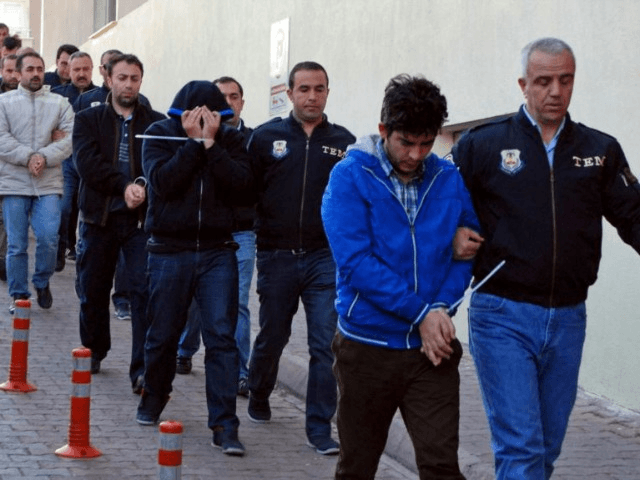A report from Freedom House called Out of Sight, Not Out of Reach: The Global Scale and Scope of Transnational Repression describes growing efforts by authoritarian nations like China, Russia, Turkey, and Iran to silence critics and dissidents living overseas, sometimes by murdering them.
According to Freedom House, China is by far the worst offender, with Turkey in second place. Rounding out the top six countries with “aggressive campaigns of transnational repression” were Rwanda, Saudi Arabia, Russia, and Iran. A total of 31 states were identified as perpetrators of “physical transnational repression” against targets living in 79 host countries.
Turkey’s program of transnational repression intensified considerably after the failed 2016 coup attempt against President Recep Tayyip Erdogan, becoming “remarkable for its intensity, its geographic reach, and the suddenness with which it escalated.”
“The campaign is also notable for its heavy reliance on renditions, in which the government and its intelligence agency persuade the targeted states to hand over individuals without due process, or with a slight fig leaf of legality,” the report said.
Freedom House identified 58 political renditions from Turkey since 2014, from host countries spread around the world, and said even this number “is almost certainly an undercount.” Despite spirited efforts across two U.S. administrations and counting, Turkey has not yet been able to extradite the alleged mastermind of the coup, exiled religious leader Fethullah Gulen, from his home in Pennsylvania. Gulen denies any involvement and Erdogan’s government has failed to disclose any significant evidence linking him to the event.
Turkey is also aggressively using transnational repression techniques against the Kurdistan Workers’ Party (PKK), a militant Kurdish separatist group with a long history of violence. Freedom House conceded the PKK is a legitimate security threat for Turkey but criticized the methods used against PKK suspects overseas as excessive and sometimes “unlawful.”
In addition to rendition, the tools of transnational repression include “assassinations, illegal deportations, abductions, digital threats, Interpol abuse, and family intimidation.”
China, the undisputed master of these dark arts, employs all of those tools liberally but is particularly adept at family intimidation. Freedom House crowned China’s system as “the most sophisticated, global and comprehensive campaign of transnational repression” in its report.
Of all the perpetrator nations identified in the report, China is the only one that has essentially set up a network of transnational repression franchises in nearly every country where Chinese dissidents can be found. Freedom House described it as a “multi-faceted transnational repression bureaucracy” and noted top Chinese Communist officials speak openly of the need to conduct an “overseas struggle” against perceived enemies of the Party.
China brings far more advanced technology to the task than any of its competitors, it targets vast ethnic and religious groups for repression, it “does not hesitate” to use every ounce of its “geopolitical weight” against its targets, and it is not shy about targeting foreign nationals in addition to Chinese living abroad, including “human rights defenders, journalists, and others who criticize the CCP.”
“The concentration of power under CCP general secretary Xi Jinping and his emphasis on assertive foreign policy has led to an ever-more aggressive stance in Chinese foreign policy, which includes transnational repression,” the report noted.
Most of the other perpetrating nations named by Freedom House were more likely than China to simply assassinate troublemakers overseas, especially Iran, Russia, and nations that were once satellites of the Soviet Union.
A disturbing tendency outlined in the report is the growing skill of repressive nations at manipulating the political, legal, and media structures of free countries to intimidate or attack dissidents abroad. China is, again, the paramount grand master of such tactics, but others are learning how to push the buttons of liberal democracies by using allegations of terrorism and corruption against their targets and using the Internet to harass them.
The report stressed that people living in the United States, the United Kingdom, or other nominal fortresses of freedom are not fully protected against transnational repression. Family intimidation is such an effective instrument because there is virtually nothing an expatriate or refugee’s host nation can do about it.
One case study in the report was Iranian dissident journalist Masih Alinejad:
In 2018, her sister in Iran was forced to go on state TV to denounce her. In September 2019, her brother Alireza was arrested in Iran and sentenced to eight years’ imprisonment. In April 2020, her mother was also detained and questioned. Like many other Iranian journalists abroad, Alinejad says she receives constant digital and physical threats against her life.
One of the more famous victims of transnational repression spotlighted by Freedom House was Paul Rusesabagina, whose efforts to save Rwandan victims of ethnic cleansing were portrayed in the 2004 American film Hotel Rwanda. Rusesabagina lived in Europe and the United States after the events depicted in the film but remained a persistent critic of the Rwandan government.
“In August 2020 the Rwandan government kidnapped him while he was transiting through Dubai, United Arab Emirates. After being held for at least three days incommunicado, he reappeared in custody in Rwanda, where he was charged with terrorism,” Freedom House wrote.
Freedom House concluded with a raft of policy proposals for combating transnational repression, some of which amounted to simply acknowledging the problem exists and training domestic law enforcement to handle it. Imposing targeted sanctions against the perpetrators of transnational repression was also recommended.

COMMENTS
Please let us know if you're having issues with commenting.